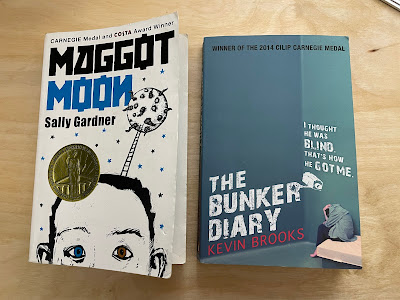The Sense of an Ending
Yes, I am getting close to the end. This month I read Maggot Moon by Sally Gardner, the 2013 Carnegie Winner, and The Bunker Diary by Kevin Brooks from 2014. Neither book did much to cheer me up, even though both are about the human spirit in the face of adversity. Both books (spoiler alert) end in death, and in the case of The Bunker Diary (even more spoiler alert) everyone dies.
I found things to admire in both books. In Maggot Moon Standish Treadwell is a wonderful creation and his relationship with his friend Hector is touching and beautifully drawn. But the future dystopian world where Standish lives—or is it a 1950s world where the Nazis won the war?—that world seems to me very like the unconvincing stage-set the authorities of Motherland have built to fake a moon landing. There's not much to it—a street, a school, a housing estate and a weird building. It's like a TV series that's been shot on a very tight budget. What's very real is the extreme violence—a teacher beating a small boy to death, critics of the regime with their tongues torn out.
And I wondered if The Bunker Diary is meant to be a metaphor for life. Is there a suggestion that although we imagine ourselves to be free we are really all in prison, locked in a bunker from which the only escape is death? Maybe.
Once again I find myself thinking about the long shadow WW2 has cast over the Carnegie, though Kevin Brooks's bunker seems more likely to be an enhanced relic of the Cold War. How long is it before historical events fade from our memories? We no longer talk much about the Crimean war or the Boer War, though now the legacies of slavery and imperialism have returned with a vengeance. But the experience of reading and thinking about these two books has left me feeling depressed. Carnegie winners in the 2010s started grim and got steadily grimmer. I don't know, because I haven't read a lot of new children's fiction in the last few years, whether these winners reflect a general trend in children's literature. The winners were chosen by librarians, who do read widely among current publications, so I have to think that they are in some ways representative of what's going on. I'm hoping things will look up in the final ten years. There'll be a new winner in a couple of months time so I thought I'd look at the shortlist, and I got sucked in to looking at the judging criteria.
I found out some things. Here, for example, is why a non-fiction book is unlikely to win the Carnegie again:
'The whole work should provide pleasure, not merely from the surface enjoyment of a good read, but also the deeper subconscious satisfaction of having gone through a vicarious, but at the time of reading, a real experience that is retained afterwards.' (From the Yoto Carnegie website, 2024)
The criteria are listed under the headings of Plot, Themes, Characterisation and Style. They appear to be specifically and only designed for the evaluation of fiction. No mention is made of non-fiction, though verse is mentioned, but it's hard to see how a non-narrative verse collection could win. And the list of questions judges are supposed to ask about the books reminded me of the kind of criteria used to make National Curriculum assessments in Literacy.
It all makes me wonder how true is this statement, also on the Carnegie website: 'All categories of books, including poetry, non-fiction and graphic novels, in print or e-book format, for children and young people are eligible.'
There are awards for children's non-fiction but it appears that the Carnegie itself is, in reality, an award only for fiction, whether in prose or verse. It might be better if it called itself the Carnegie award for fiction and had done with it.
Just in case this all sounds a bit too gloomy, I have as usual been leaping ahead in my reading and can report that there is at least one book published in the last decade that ranks with the very best, so there's that to look forward to!
Originally published on ABBA May 2024




Comments
Post a Comment